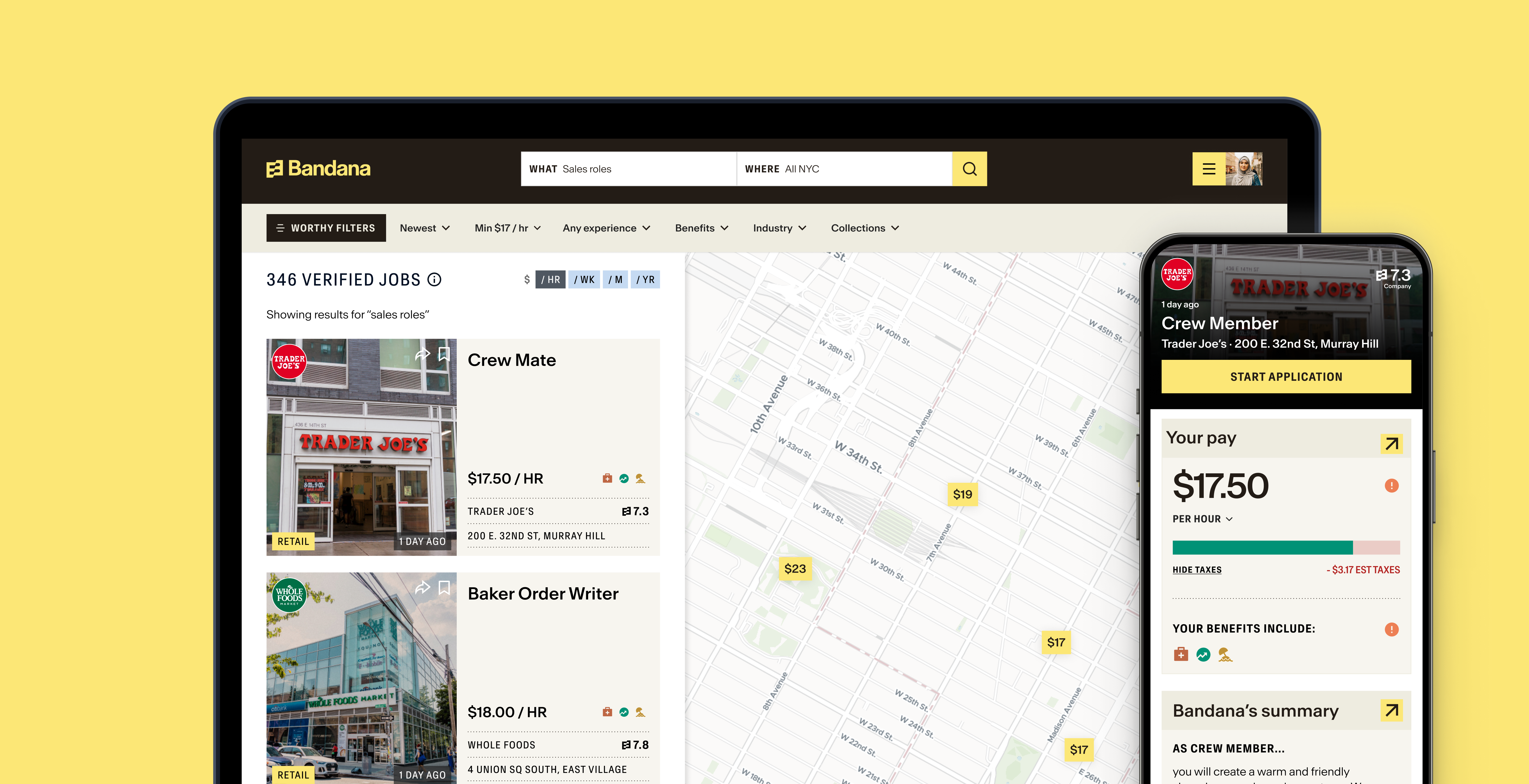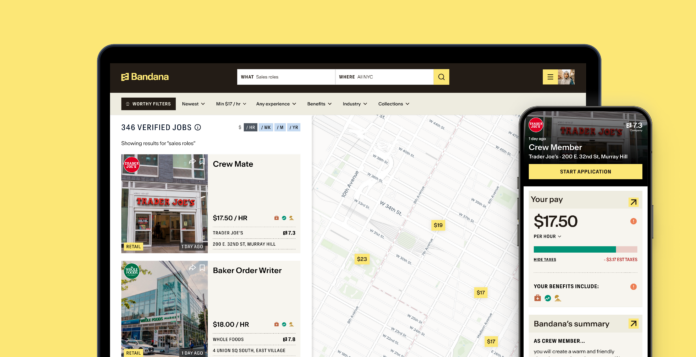Bandana is a platform that aims to revolutionize the job search process for hourly wage workers by providing them with access to better job opportunities. With a focus on jobs that pay above minimum wage, offer benefits, and provide a location close to where workers live, Bandana seeks to improve the livelihoods of workers who often struggle to find decent employment. Co-founder and CEO Timothy Makalinao, who comes from a working-class background, understands the challenges faced by this group and is determined to create a solution that rejuvenates the working class. The company recently announced a $3.8 million seed investment to bring their idea to life and plans to use the capital to attract users and expand their platform. By treating workers like people, rather than commodities, Bandana aims to build a successful business that positively impacts the lives of hourly wage workers across America.
Bandana: A Platform for Hourly Wage Workers to Find Better Jobs

Overview of Bandana and its Mission
Bandana is a platform that aims to help hourly wage workers find better job opportunities. The co-founder and CEO, Timothy Makalinao, grew up in a working-class household and witnessed the challenges faced by hourly wage employees in finding decent work and supporting a family. With this firsthand experience, Makalinao launched Bandana with the mission of creating a solution specifically for this group of job seekers. Bandana’s goal is to connect workers with jobs that pay above minimum wage, offer benefits like health insurance and paid time off, and provide a convenient location. The platform aims to rejuvenate the working class of America by making it easier for them to find better job opportunities and ultimately improve their livelihoods.
The Two-Sided Marketplace Model
Bandana operates on a two-sided marketplace model, with job seekers on one side and employers on the other. By bringing these two groups together, Bandana creates a platform where workers can find suitable job opportunities and employers can connect with potential employees. The platform focuses on jobs in the New York City area initially. While the company has altruistic intentions, it also recognizes the need for economic viability. Makalinao, with his background in finance and strategy, emphasizes the importance of building a sustainable business model to achieve their mission effectively.
Early Beta Test and Differentiation from Competitors
In Bandana’s early beta test, the platform attracted 30,000 users without any advertising or marketing efforts. This organic growth sets Bandana apart from competitors like Indeed, which spend millions of dollars on advertising to attract job seekers. Bandana’s approach is to offer a personalized experience for workers, treating them as individuals rather than commodities. By establishing this unique value proposition, Bandana aims to attract workers without the need for costly user acquisition strategies.
Seed Investment and Plans to Keep the Site Free
Bandana recently secured a $3.8 million seed investment to bring its vision to life. With this capital, the company plans to keep the platform free for approximately a year to attract users from both the job seeker and employer sides of the marketplace. By offering a free service, Bandana aims to generate significant user adoption. However, the long-term plan is to monetize the platform by charging employers for job postings, granting them access to a pool of qualified workers.

Integration with Major Employers’ Job Posting Websites
To ensure a steady supply of job postings, Bandana is integrating with major employers’ job posting websites. This integration allows Bandana to automatically pull job postings into their platform, creating a comprehensive database of available jobs. By aggregating job postings from various sources, Bandana provides a one-stop shop for workers looking for job opportunities. This partnership with major employers strengthens Bandana’s position as a valuable resource for both job seekers and employers.
Monetization Plans and Future Expansion
Bandana’s monetization strategy revolves around charging employers for job postings on the platform. By offering access to a pool of qualified workers, Bandana aims to provide employers with significant value and make the cost of job postings worthwhile. In the future, Bandana plans to expand its geographical reach beyond New York City and explore additional features like certifications. These certifications would enable workers to access higher-paying jobs and opportunities for career growth. Bandana is also considering fintech solutions to assist workers with savings and improve their understanding of money management.
Adding Additional Features and Certifications
As Bandana evolves, it plans to add additional features to enhance the user experience. One area of focus is certifications. By offering certifications, Bandana can help workers improve their qualifications and increase their chances of securing higher-paying jobs. These certifications would provide employers with a standardized measure of a worker’s skills and expertise, making the hiring process more efficient and reliable. Bandana aims to empower workers to continually develop their skills and boost their earning potential.
Considering Fintech Solutions for Workers
In line with its mission to improve the livelihoods of hourly wage workers, Bandana is exploring fintech solutions. Fintech refers to the use of technology to enhance financial services, and in Bandana’s case, it involves leveraging fintech to assist workers with savings and improve their financial literacy. By providing tools and resources related to money management, Bandana aims to help workers make informed financial decisions and achieve greater financial stability.

The Lean Team and Hiring Strategy
Currently, Bandana operates with a lean team consisting of six employees, including the three founders. The team’s size reflects their focus on efficiency and resourcefulness. As a mission-driven organization, Bandana is deliberate in its hiring strategy, emphasizing the importance of hiring individuals who align with their vision and reflect the community that will be using the platform. Bandana believes that the right team members can significantly influence how they are perceived and how effectively they can achieve their mission.
Investment Details and Launch Plans
Bandana’s latest seed investment was led by General Catalyst and Craft Ventures, with participation from Triple Impact Capital, Sarah Smith Fund, and several unnamed angel investors. This injection of funds enables Bandana to further develop and refine their platform. Having already conducted a soft launch beta, Bandana plans to launch an updated and rebranded website on September 25th, 2022, to continue testing and iterating on their idea. With ongoing enhancements and user feedback, Bandana strives to create a robust platform that meets the needs of both workers and employers while driving positive change within the hourly wage workforce.
The comprehensive article provides a detailed overview of Bandana, its mission to help hourly wage workers find better jobs, its two-sided marketplace model, its beta test and differentiation from competitors, its seed investment and plans to keep the site free, its integration with major employers’ job posting websites, its monetization plans and future expansion, its focus on additional features and certifications, its exploration of fintech solutions for workers, its lean team and hiring strategy, and investment details and launch plans. With a friendly and informative tone, the article highlights how Bandana aims to make a meaningful impact on the lives of hourly wage workers by connecting them with better job opportunities and ultimately improving their livelihoods.










